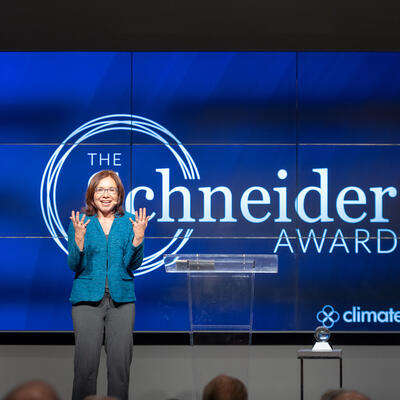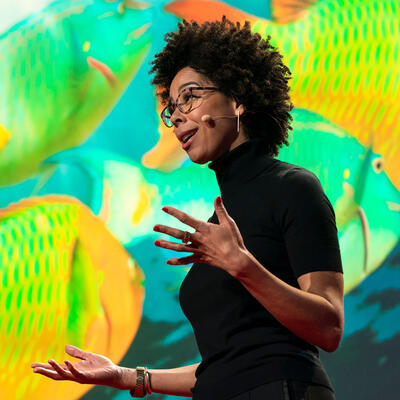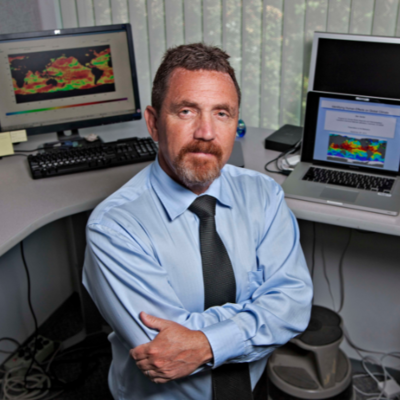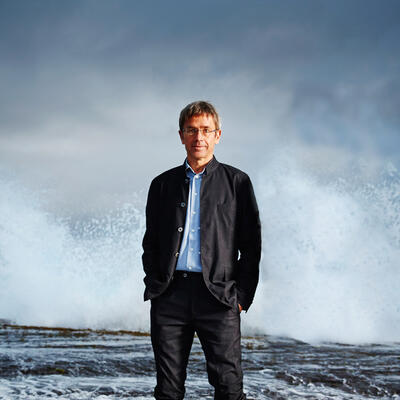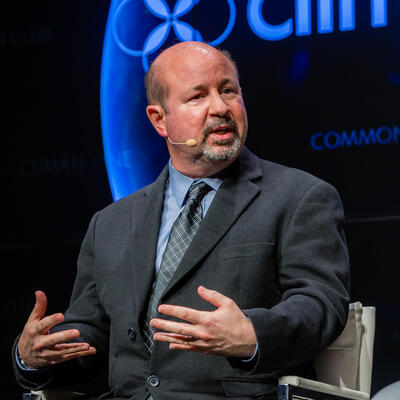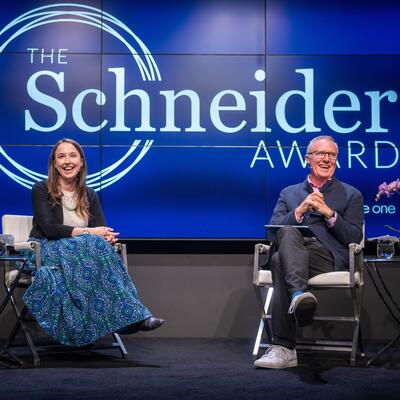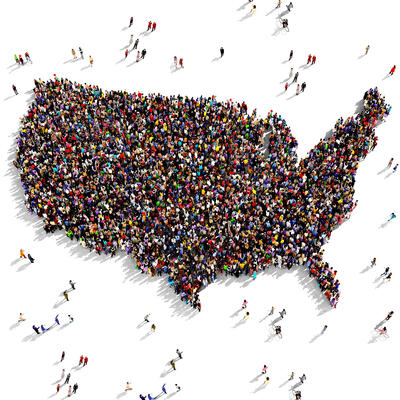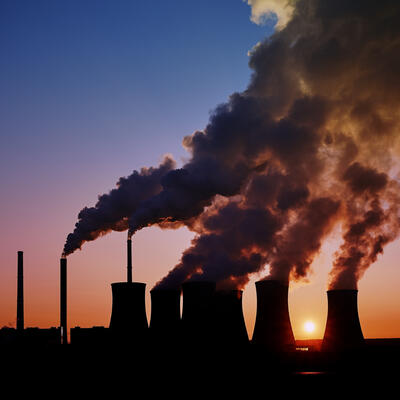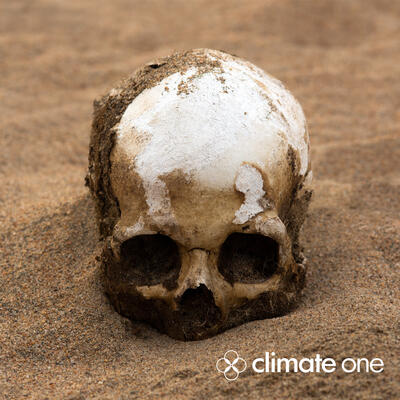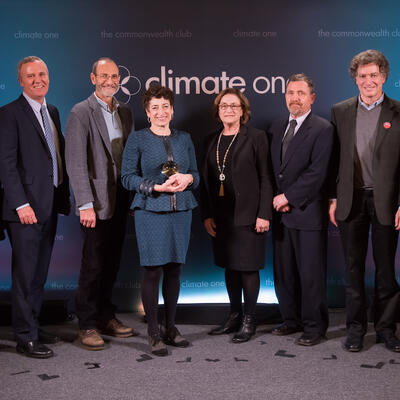
The Sixth Annual Stephen Schneider Award: Naomi Oreskes and Steven Chu
Guests
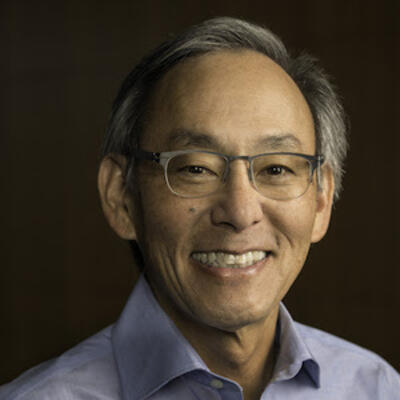
Steven Chu
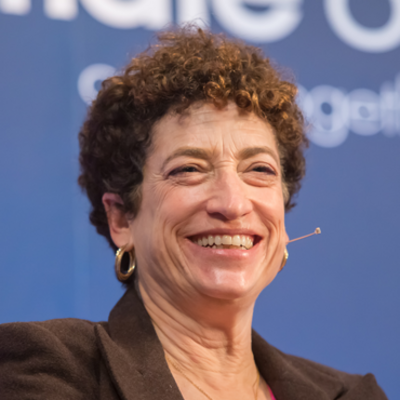
Naomi Oreskes
Summary
Science historian Naomi Oreskes has had her share of hate mail from climate deniers. But, she says, “We can't give up on the challenge of explaining science.”
Naomi Oreskes, Professor of History of Science and Director of Graduate Studies, Harvard University, author of “Merchants of Doubt: How a Handful of Scientists Obscured the Truth on Issues from Tobacco Smoke to Global Warming.” (Bloomsbury Press, 2011)
Steven Chu, Former U.S. Secretary of Energy; Professor of Physics and Molecular & Cellular Physiology, Stanford
This program was recorded in front of a live audience at the Commonwealth Club of California on December 15, 2016.
Full Transcript
In 2015, Time Magazine reported that only 16% of Americans said climate change is not real. The lowest point since it started asking that question. Now the election of Donald Trump has moved climate denial from the political fringe to the White House. We’ll hear about attacks on science in the second half of the program from former U.S. Secretary of Energy Steve Chu, who is a Nobel prize-winning scientist. We also will talk about when average Americans will see electric cars they can afford, and other ways to grow and clean the U.S. economy.
First, we’ll dig into the story of doubt with Naomi Oreskes. You might call her doctor 97%. In 2004, she wrote a seminal essay that found that 97% of scientific articles identified humans is the primary cause of warming over the past 50 years. She later co-authored the book, “Merchants of Doubt: how a handful of scientists obscure the truth on issues from tobacco smoke to global warming.” Silicon Valley entrepreneur Jeff Skoll made the book into a documentary film by the same name.
And today Climate One will present her with the Stephen Schneider award for outstanding climate science communication. Each year Climate One presents an award in memory of the late Stanford professor who was a founding father of modern climate science. He also advised me when I was creating Climate One as a project here at the Commonwealth Club. He was a fearless communicator of the risks of using the sky as a free sewer and the moral necessity of cleaning up our act for our children. Please join me in welcoming Naomi Oreskes to Climate One.
[Applause]
Dr. Oreskes, I’d like to begin with a message from Terry Root, the wife of the late Steve Schneider who wrote “Steve thought the world of you and said that you had done more to help public understanding of climate change than 99.9% of us working on the problem.”
Naomi Oreskes: Not 97%?
Greg Dalton: No, you beat your own number there. So what did Steve Schneider do contribute, what is his legacy in terms of as a communicator, as a fighter for and defender of science?
Naomi Oreskes: Well I think the crucial thing that Steve did was very early on Steve understood or recognized the necessity of talking about climate change to the broader public. He didn't take the approach that it was enough simply to do his scientific work, to do his climate modeling and then assume that somehow the world would, you know, receive it and act upon it. He didn’t make that assumption. He recognized that he had to do active work to explain it to people to communicate and to talk about what possible solutions we might have.
Greg Dalton: He stepped into the public realm. A lot of scientists publish their paper. They say I don't get paid to be in political fights. It's not part of my –
Naomi Oreskes: Not my job.
Greg Dalton: – my job or my compensation, or my tenure that sort of thing. So he put himself out there. And have other scientists done that since then or people kind of, it’s nasty business. Some scientists wanted to stay in their lab and kind of stay there.
Naomi Oreskes: Oh I think most scientists want to stay in their lab. And that’s okay, you know, that’s understandable because you don’t become a scientist because you love politics. You become a scientist because you love science. You love the experience of scrapping with the natural world. The experience of just appreciating how amazing and complicated and wondrous the natural world is or because, you know, maybe you’re a little bit Asperger’s, you don’t actually like people, you know what I mean. So there are many different reasons why people become scientists, but not one of those reasons is because they like politics. So you have a kind of – no, but I mean it’s true, right. So you have a kind of self-selection against political engagement, against communication.
Now that said, I think the great legacy of Steve and it was tragic. But one of the silver linings of his early death was that when Steve died, I think a lot of people realized there was this giant vacuum that was left after we lost him. And people began to talk about who is going to fill his shoes. And I think we all realized that no one person could do that, now a lot more of us had to become involved. And so I think a few of us who were already doing it, we stepped up our game and a lot more people got involved. So Richard Alley is here tonight. Ben Santer, Mike Mann who’s been with us this week.
[Applause]
Katharine Hayhoe, I mean a lot of scientists have stepped up to the plate and done really tremendously important work. But we clearly need to do more.
Greg Dalton: There’s even a T-shirt I think that “It’s now up to us” that some people wear. You call yourself a Sputnik baby and you're a girl who went into mining, not common. So tell us that story, how you got into science.
Naomi Oreskes: Well growing up I was interested in a lot of different things. And I was one of these people actually had trouble deciding what to do because I had a lot of interests. And my interests were disparate, I loved science and I was relatively good in math. But I also love reading fiction and I play the piano. So, but I had to choose something and, you know, I was born in 1958. I was born in the same year as the Keeling Curve. And in the 1960s growing up in the United States, if you were able to do science, you were strongly encouraged to do that. And teachers definitely said to me, and I remember very clearly. My best subject in high school was actually French. And I remember at one point saying to the teacher, well, I wasn’t really sure what I was going to do in college. And she said, “Well, it would be a complete waste to be a French major.” So like well, I don’t actually think that was right.
So, you know, I was definitely pushed in the direction of math and science. And then of course as a girl, so I was in high school and college in the 1970s. And that’s just when the idea of that there should be more women in science that people should support women to go into science was gaining traction. So I would say there was a lot of social pressure actually, that if you were a girl who could do science, that you should do science. And that wasn't necessarily a bad thing so I ended up in geology because I love being outside and I love rocks and minerals, I still do. As my husband can attest, I carry around boxes of rocks for no apparent reason. That’s apparent to me but not to anyone else in my family. So I started doing geology and I liked it and I was good at it and there was work, you could get a job. You could be paid money to do geology. So it was good and that's what I did for a number of years. But I always had all these other interests and at a certain point the other interests began to resurface.
Greg Dalton: And how did you get onto the tobacco story?
Naomi Oreskes: Okay, fast-forward. So I became a historian of science. My specialty is the history of Earth and environmental sciences. And in the early 2000’s I developed a project, took on a project on the history of Cold War oceanography. And what I wanted to understand was what difference does it make who pays for scientific research. And I thought this was a good place to look at that because tremendously important science was done in American oceanography after World War II. And almost all that was paid for by the U.S. Navy. And I thought, well that’s an interesting opportunity then to look at how the interests of a particular patron shaped the scientific work that's being done. And I was living and working in San Diego at that time, teaching at the University of California, San Diego with a joint appointment at the Scripps Institution of Oceanography. We had a fabulous archive of oceanography. So I thought, oh this is great I can do this project, go to the archives and still be home for dinner. So it was an interesting project. It was pragmatic at a certain stage in my life when that was important.
And so I started doing this work and stumbled across a body of papers about a group of oceanographers who in the late 80s, early 1990s began to consciously suggest that oceanographers should move into climate change research. And I thought that was interesting. It was interesting from a number of angles. But one of the things that I saw was that these scientists were saying already in 1988, ‘89 that climate change was likely to be a very serious problem. That there were important scientific questions related to the ocean atmosphere interactions and ocean heat uptake, many of the issues that we’re concerned about today. And that it was really important for oceanographers to be involved in this and that there was this legacy, this earlier legacy dating back to Roger Revelle and Dave Keeling.
So this was a sort of natural thing for these scientists to move into. And I thought that was interesting so I started learning more, researching more about this longer history of climate change research associated with oceanography going back to 1950s. And as I began to read this literature, I came to realize that the science was much older and much more grounded than most people knew. And I started coming to the climate sessions here at AGU. And I realized that there was a giant disconnect between how scientists were talking about climate change as something that was underway. That was the confirmation of a prediction that had been made 50 years before. That was real, that was caused by greenhouse gases in the atmosphere versus how it was being present in the mass media. In the mass media it's being presented as a big debate. In the scientific community it’s being discussed as something that's known and there are a lot of details we need to understand we have to work out what's going to happen in the future. So it was that disconnect that led me to write the paper on the scientific consensus that you just referred to.
[00:19:56] Greg Dalton: And we’re going to hear from a tobacco warrior that connects this tobacco narrative with the oil narrative. Stanton Glantz is a key figure in the tobacco wars of the 1990s. He's a professor, runs a center at UC San Francisco. Let’s hear from Stanton Glantz.
[Start Video Clip]
Stanton Glantz: My name is Stanton Glantz. I’m a professor of medicine at the University of California, San Francisco. I'm also the director of the Center for Tobacco Control Research and Education. On May 12, 1994, I got a box of documents that have been spirited out of Brown & Williamson Tobacco Company that showed that the tobacco industry knew back in the 60s that was nicotine was addictive. They knew smoking caused cancer in the 50s; they knew it caused heart disease. And they developed a sophisticated strategy of science, manipulation and denialism to keep the public confused and to forestall meaningful regulation of tobacco products.
One of the really important insights the tobacco companies had way back in the 50s or the 60s was that they didn't actually have to win the debate in the sense of convincing people smoking didn't cause disease. They just had to create doubt. The tobacco companies came up with this idea of sound science and junk science. But what the industry tried to do was set the standards for drawing scientific conclusions so high that it was effectively impossible to implicate secondhand smoke is causing lung cancer.
In the olden days, you know, people like me who'd been going up against the industry for years would say, you know, these guys are bad, they’re dishonest, they’re corrupting the political process. They’re corrupting the scientific process. They operate through front groups. They have all the shadowy ways of moving money around. And people would look at you and just say, you know, you’re paranoid delusional. But when it was the industry in its own words saying it and when policymakers and the public, and people in the scientific community and the courts were confronted with these realities, it started to change the way people thought about the issue.
[End Video Clip]
Greg Dalton: Stanton Glantz from the University of San Francisco, California. So connect for us Naomi Oreskes that tobacco narrative with the oil narrative.
Naomi Oreskes: Sure. So after I published my article on The Scientific Consensus, I started getting attacked. I got hate mail, I got threatening phone calls. And I was attacked by Senator James Inhofe from Oklahoma. Now at the time nobody outside Oklahoma knew who Senator Inhofe was. Now we all know who he is. But at that time, I had no idea who this guy was and why would a senator from Oklahoma attack me over a paper that simply analyzed what the state of debate was in the scientific community. And so I started digging a little bit trying to figure out what was going on.
And just by coincidence, I was at an academic conference a very, very, very exciting conference, the International Commission on the History of Meteorology. And it happened that Erik Conway was at that meeting and we started chatting. And I told him a little bit about what was going on and he said “Well, Naomi, the people who are attacking you are the same people who attacked Sherry Rowland over the evidence of the ozone hole.
So Erik said – this conference was in Germany. He said “When we get back, I’ll send you some stuff.” So I get home and there’s this big packet of materials that Erik has sent me all about the attacks on the scientists who predicted and then discovered and that, you know, demonstrate documented the ozone hole. And Erik was right, it was the same people. And not only was it the same people, but the sentences were virtually identical except you take out the word ozone and putting global warming. So it’s the same arguments the same strategies and tactics, but just ozone had now been replaced by climate change. And so I started digging a little bit to try to find out a little bit more about these people. And it struck me that these were not nobodies; they were actually significant people.
So one of the people in this group of documents was Robert Jastrow, who’s a very famous astrophysicist who I actually knew in my first teaching job at Dartmouth College, he was a colleague of mine. And I knew that Bob Jastrow was an Old Earth creationist. And I knew that he was considered a little bit persona non grata by some of his scientific colleagues for popular books he had written that basically argued for a sort of creationist view of scientific discovery. So that was kind of an interesting little thing. And then one of the other people was Frederick Seitz. And Frederick Seitz is a very famous solid-state physicist. He was a former president of National Academy of Sciences. So I thought, why would a former president of the National Academy of Sciences be doubting climate change? So I started digging a little more. And then I found out that Frederick Seitz had worked for R.J. Reynolds tobacco. (0:26:00)
So then I called my colleague Robert Proctor who now teaches here at Stanford. And I said, “Robert, have you ever heard of a man named Frederick Seitz?” Robert says, “Have I ever heard of Fred Seitz?” and then the next few days later, another big package arrived in the mail. And it’s a file like this, of Fred Seitz’s working relationships with R.J. Reynolds tobacco and it was staggering to see. And that's when we realized this connection that these people had learned the strategies and tactics working with the tobacco industry.
Greg Dalton: And those smoking gun documents were critical in their own industry, in their own words. Are there similar documents of oil companies; is there the same kind of smoking gun for oil as there was for tobacco?
Naomi Oreskes: Well the answer is not yet. I mean part of the reason we have all these documents about tobacco is because of the litigation against the tobacco industry. Most of these documents came out through discovery. So we don't yet know what documents will or won’t turn up about the oil industry. My guess is that Exxon Mobil probably has a very effective document retention policy, meaning, document destruction. So I think that people have learned from history. But nevertheless, you know, I mean, well, sometimes I actually, I'm a very open person and I am absolutely committed to truth and openness in all things. But I do have some thoughts about where key documents may be found that I actually think it's better not to share right now just because of where we’re at in terms of the legal situation.
Greg Dalton: Do you think that all doubt is manufactured, is there genuine, legitimate doubt that people have for religious reasons or because part of their tribe or their social group have a certain belief?
Naomi Oreskes: Well, I think you have to separate out two different things. There's always doubt and uncertainty in science because that's part of what it is to do investigations, part of what it is to be curious. I mean, without doubt, we wouldn't have curiosity. Without curiosity, we wouldn’t have science. So to me what is so noxious and so pernicious about what these people do is they take a good thing, healthy curiosity, healthy skepticism, healthy doubt, something that drives inquiry that drives discovery and they turn it against science. They turn science against itself. And that is so noxious, it cuts at the core of what science is. And it's very hard to fight because we can't say, if someone says, well there’s a lot of uncertainty about climate science. We can’t say, no there's no uncertainty. That would be false.
We know of course there are uncertainties. So we’re having to make an argument that is much more nuanced than theirs. We’re having to say, yes of course there are uncertainties. And uncertainty on some level is a good thing because it drives inquiry. But nevertheless, we know a lot. We have a lot of very secure knowledge that’s supported by tremendous amounts of evidence gathered by literally tens of thousands of scientists working across the globe for more than 50 years. We have good reason to believe that this information is robust. But that's, you know, that just took me seven sentences to say, right as opposed to well, I don’t know, I think the science is unsettled, right. And that's the challenge we face.
Greg Dalton: So do you think science is – that the narrative even should be based on science? Maybe science is so complex that it's hard for average Americans to grasp and maybe there's things other than science that ought to be looked.
Naomi Oreskes: No. We have to have the science because if we don’t have the science then people don’t understand why we need to act, right.
Greg Dalton: There’s no urgency.
Naomi Oreskes: There’s no urgency. I mean, without the science there's no explanation of the cause, right because we know that climate change is underway and we know a lot about the causes.
If we didn't know what the cause was we wouldn't be having the conversation we’re having today about things like carbon pricing or green energy. And if it were just about energy security, we could burn coal, right. We have a lot of coal in this country. We have a lot of coal in the world. So we have to explain the science because it’s the science that explains the causes and it’s the science that explains why we need to act on this problem. And again, so that's part of the challenge we can't give up on the challenge of explaining science. We have to do that but we have to find ways to make it make sense to people.
And we can do that, I really know that a lot of people are interested in science. Millions of people every year go to science museums, go to aquaria. There's tremendous amount of interest in nature and science. People here go to the Exploratorium, you know, they go to the Academy of Sciences. People, a lot of people actually love science, but we have to present it in ways that they understand. And that can be challenging for us, especially for climate scientists because so much of the information is quantitative. So much of the information comes out of quite complex numerical simulation models that have millions of lines of code. So the challenge is to take all this complex and quite sophisticated science and convey it in a way that ordinary people can understand.
Greg Dalton: If you’re just joining us, we’re talking with Naomi Oreskes, professor of the History of Science at Harvard University and co-author of the book, “Merchants of Doubt.” I'm Greg Dalton. We’ll be right back after this.
[CLIMATE ONE MINUTE]
Announcer: And now, here’s a Climate One Minute.
The Stephen Schneider Award for Outstanding Science Communication honors scientists whose stories help us understand what’s happening in our world. Last year’s winner, Dr. Chris Feld of the Carnegie Institution for Science, spins the risky business of climate change into a metaphor we can all relate to.
Chris Field: So, you know, I think of the global economy as being a big semi-truck that's driving along the road and that’s creating amazing value for lifting billions of people out of poverty. Every reason to understand that that truck’s progress has been a good thing overall. But it is leaking these nails on the road behind it in the road that the rest of us are driving on. And, you know, at first the occasional flat tire was an issue. Some of those flat tires led to really serious accidents and once you get a lot of serious accidents you have the possibility of really catastrophic pileups. And that's the way I see the climate system unfolding. It's not mostly about the averages, it's mostly about the extremes and it's mostly about the way extremes interact or extremes interact with lack of preparedness. The car with bald tires or a really bad bumper is in much worse shape than a car that's well-prepared.
The smart thing to do though is to make sure that we don't get so many nails that the adaptation strategies don't work, and that's the mitigation strategy, decreasing the rate at which these nails go on the road.
Announcer: Chris Field is founding director of the Department of Global Ecology at the Carnegie Institution for Science. He received the Stephen Schneider Award in 2015. Now, let’s join Greg Dalton and our live program at The Commonwealth Club.
[END CLIMATE ONE MINUTE]
Greg Dalton: I’m Greg Dalton and this is Climate One and we’re joined now by scientist Steve Chu. He won the 1999, 1997 Nobel Prize in physics for his research on cooling and trapping of atoms with laser light. As President Obama's first Secretary of Energy, he was instrumental in the stimulus plan that directed billions of dollars into renewable energy. He is currently professor of physics in Molecular and Cellular Physiology at Stanford University. Please welcome him to Climate One.
[Applause]
Secretary Chu, there’s been a lot in the news lately about surveys sent to people at the Department of Energy asking about are they now or have they ever been a climate scientist or attended a climate conference. Is that unusual, what do you make of that?
Steven Chu: Yes, very unusual. I don't actually know of any other case where that has occurred. It is very startling, the Department of Energy people have said, I'm sorry, we’re not going to answer this.
Greg Dalton: That is okay now.
[Applause]
They still have President Obama and Secretary Ernest Moniz protecting them. What happens down the road? Can you refuse to answer a question from your boss when you’re a civil servant at the Department of Energy?
Steven Chu: There turns out to be a lot of inertia for better or worse in the federal government. And in that respect there's issues having to do with many people don't realize that a lot of the cabinet positions are agencies and it's not political. In fact I would say 99.9% of the Department of Energy business has nothing to do with politics. And so there are career people who are there to put in vernacular inspect the bridges things like that. Keep the nuclear stockpiles, sort of clean up the Cold War legacy. So those career people have mechanisms that said, you know, we have a job to do that go beyond who's in the White House and what parties are in Congress. And so that inertia is something as I said for better or worse is something that is there to protect the majority nonpolitical part of all the agencies. And most people don't realize that most of these agencies are only – really a fine veneer is political, there's – inspecting a bridge is not political.
Greg Dalton: CNN anchor Chris Cuomo had an interview recently with Anthony Scaramucci who’s part of President-elect Trump’s transition team. And he asked about why the Trump administration is trying to get names of people who’ve worked on the issue of global warming and this gets to some of the doubt and issues we've been talking about. Let’s listen to this report.
[Start Video Clip]
Anthony Scaramucci: I think, you know, look I mean I know that the current president believes that the human beings are affecting the climate. There are scientists that believe that that's not happening. I think that, you know, for me personally –
Chris Cuomo: The overwhelming consensus in the scientific community is that man’s actions –
Anthony Scaramucci: Chris, let me finish.
Chris Cuomo: – have an impact on science. [crosstalk] So you have to correct that whenever it comes up. Go ahead.
Anthony Scaramucci: Chris, there was an overwhelming science that the earth was flat and there was an overwhelming science that –
Chris Cuomo: It’s called ignorance. You’ll learn over time.
Anthony Scaramucci: – we are the center of the world. A 100%, you know, we get a lot of things wrong at the scientific community. You and I both know that.
[End Video Clip]
Naomi Oreskes: Suddenly he’s a scientist; we got a lot of things wrong, right.
Greg Dalton: Anthony Scaramucci part of the Trump transition team and CNN anchor Chris Cuomo. Naomi Oreskes, so how do you respond to that like flat earth and people been wrong before they could be wrong now on climate?
Naomi Oreskes: Well first of all, he’s totally wrong about the flat earth. Scientists never thought the earth was flat. Scientists have known since the Greeks that the earth was round. So the people who thought were flat earth were the effectively the equivalent of the climate change deniers today. And this is a classic –
[Applause]
– Thank you. I mean it’s a classic climate change denier strategy actually accuse the other side of doing the things that you're doing. So they are the flat earthers, not the climate scientist.
Greg Dalton: Secretary Chu, how do you think that scientists ought to respond to these sorts of things in this new political era where deniers are running the show?
Steven Chu: Well, I think that Naomi is a great example of this. You try to patiently point out. No, this is not the way science works. You patiently point out that the whole basis of science is skepticism. Scientists are professional skeptics. You don't get famous for saying, yeah Einstein's theory seems to be right. You get famous and you get your charge from saying, oops, maybe something was overlooked. Oops, you know, maybe there's something we didn't understand and then you pursue that. And so the whole issue of now there’s this herd effect is contrary to the very basis of how scientists actually work.
Greg Dalton: And Naomi Oreskes, one thing underlying this is relationship of risk and probability. Some people say Americans don't understand probability, you know, all these percentages of like different scenarios. Is that true?
Naomi Oreskes: Well, you know, I haven’t studied the question of what Americans do or don't understand about risk and probability. But I think we all understand in an intuitive way, you know, we make calculus of probabilities in our own lives when we make decisions about buying life insurance. I mean this was saying that Steve talked about all the time, you know, we have life insurance, we have fire insurance. Many of us have disability insurance. We understand that chances are those terrible things won't happen to us, but nevertheless we still buy insurance. But the problem with that metaphor in my opinion is that it seems to imply that the risk of something really bad happening from climate change is remote. Whereas actually we know that climate change is already happening.
So the fire insurance risk – maybe a better analogy is the earthquake insurance risk. Living here in California, you know that sooner or later there will be an earthquake and you hope it won't be serious. But, you know that there’s a possibility that it could be quite catastrophic. So I think climate change is a bit more like earthquakes. We know that the climate is changing. We know that we will see impacts. We’re not quite sure of how serious they’ll be but we certainly know just like we know living here in San Francisco, you know, that even a magnitude 6 earthquake has the potential to do tremendous damage. And a magnitude 7 or 8 is a catastrophe. So climate change is more like that. The question now is not whether their impacts. The question is only how bad are those impacts going to be and how quickly will they unfold.
Greg Dalton: And Steve Chu what are those impacts. Would you say to an average American person listening to this, we associate climate change with polar bears, melting glaciers things that people will never see. What do you say, how will it affect me in my lifetime?
Steven Chu: Before I answer that, I’m going to respectfully slightly nuance what Naomi said.
Naomi Oreskes: Please do. Yeah, please do.
Steven Chu: Climate change is not going to be a rare event. I think it's more like health insurance, where as you get older, the probability that you will have some serious ailment goes higher and higher. And therefore it's prudent if you can afford it and quite candidly, the nation can afford a designation for those who can afford it to say the probability is higher and higher you will have serious health problems. These health problems could bankrupt you. These health problems have devastating effects on you, your family and the people around you.
So it's not a rare occurrence. It's more like these things are going to be happening. To what extent, what will happen, there are risks. But in the aggregate, there is a small segment of the population – if you're in a very cold climate you want to see more warmth, that's great. But in the aggregate, it doesn't look good at all. And so the nuance of people who look at this and study it and follow it and are now beginning to do statistics on it is looking there's uncertainty, it could be bad, it could be really bad or could be catastrophic. So that’s the nuance, the uncertainty.
Naomi Oreskes: Yeah, great. Thank you. You’re right. That’s the right analogy. It’s not the earthquake. Because you’re right, even though we know earthquakes will happen, they don’t often happen very often. And not everyone is affected by them. Everyone will be affected by the impacts of climate change.
Steven Chu: Right. Everyone's going to be affected. And there would be a few people who lived the age of 90, you know, untouched by serious disease, but rare. And so what are the risks? The first ones I think are what I would call stability in the ability to produce food on a country's borders risks including the United States.
Which include the water supplies and the sinking water tables. And if you have a collapse in agriculture, this could be devastating. Now, we don't know whether the Syrian collapse of agriculture was a climate or a bad weather problem. We don't know whether in parts of Africa it is. But as we look going forward, the probability that you can say that was the weather, this was climate. It doesn't parse that well. It’s like a famous baseball player in San Francisco named Bobby Bonds. He's all of a sudden hitting 60 and 70 home runs.
Greg Dalton: Barry Bonds, yeah.
Steven Chu: And was that home run because he’s a great athlete or is that home run because he had steroids, right? It’s meshed in but it's coming well out of the noise that the climate is changing. The weather impacts statistically over the last 3, 4 years are very clear-cut. You know, there are more heat spells, very serious heat spells. There are more downpours, things like that. The collapse of agriculture I think and the water supply risks are the most immediate ones. Sea level, slowly creeping, creeping, creeping, but that's one of those, to quote Carl Sandburg, one of those “comes on little cat feet” right. Because I talk about sea level rise from the last warm period 120,000 years ago. The historical record, one degree warmer is not a climate model. This is just simply the historical record. Where the seashell critters living at what level, it was 6 to 9 meters higher. So if we meet the UN climate goal we’re 6 to 9 meters higher. The question is, is it going to take 500 years, 200 years, 2000 years.
And everything recent is a bit faster but that – before we see that which is catastrophic because that means 10% of the world population are climate refugees, you will see more immediate climate refugees from a collapsing agriculture.
Greg Dalton: And even for someone who grasps these risks. Sometimes it's hard to understand okay, what can I do about it? And some people think that they’re sort of this socially constructed silence around climate because even if I accept it, I don't know what to do with these risks. How I can affect change so I’m just going to block it out of my mind. Naomi Oreskes, might just call that cognitive dissonance. But how can someone say okay, I accept it, but what can a person do?
Naomi Oreskes: Well, you know, it’s interesting I’ve been talking with people a lot about that this week at the American Geophysical Union and about the whole issue of messaging. And again, this is a really a tough one for scientists because most of us have no training in communication, marketing, advertising any of those kinds of things. And we kind of feel like we don't want to. I mean, marketing, advertising, those are the things that are very uncomfortable for scientists because they're associated with, you know, untruth, hype. But I think we have to –
Steven Chu: Well I would say 99% of the scientists or 98%.
Naomi Oreskes: There you go. 97%. But in general, you know, I mean even for me as a person who spent a lot of the time in the last, I don’t know what 10 years in this role as a communicator. You know, it’s still sort of uncomfortable to think about turning complex problems into sound bites. But I think we have to because otherwise people do just throw up their hands in despair so. And actually I saw Hunter Cutting was here and Hunter I want to talk to you about this. I was thinking today and also because people asked me constantly what to do. I hear scientists being asked what to do. And I’ve been on a room a lot of times where scientists or people say what should we do and scientists shrug their shoulders or they say vote, you know. So I was thinking today, so here’s my sound bite message.
There are three specific things I think that we could do in this country that would make a difference. Stop building more fossil fuel infrastructure, eliminate subsidies for fossil fuels and put a price on carbon.
[Applause]
And if you haven’t done it already, you should change your light bulbs.
Greg Dalton: Steve Chu, the G20 countries have pledged to eliminate fossil fuel subsidies. That has happened, Nicholas Stern, the economist has been here. The governments have said that but it's slow in happening and a lot of countries people stay in power by subsidizing fossil fuels to keep the people happy and moving around, you know, nothing gets Americans angry than the spike in the price of gas. Every politician knows that but why isn’t that happening faster?
Steven Chu: Because politicians are following the second golden rule in politics which is to get reelected. The first is to get elected.
Naomi Oreskes: Oh, I thought the first was he who has the gold makes the rules.
Steven Chu: Well, this is a physicist’s empirical rule there are no fundamental Maxwell's equations.
Naomi Oreskes: There’s no author.
Steven Chu: There’s no law yet. But I would say that it's a cheap temporary way of not getting voters angry at you. And the issue of fossil fuel subsidies can go from driving around at 25 cents a gallon of gasoline in some countries to our own country where if you look at the renewable energy subsidies and the fossil fuel subsidies and the dollar amount, fossil fuel still trumps it by a lot.
And the fascinating thing is I was at a senate hearing and a well-meaning person said, well, we’ve been subsidizing renewables for a long time. When do you think it should stop? And I said, well maybe in 10 years. I think if you count from the late 70s when Carter started doing this to now. And from 50 years, we’ve been doing fossil fuel for 100 years. We should stop them all at the same time. I do think 10 years from now we won't need it if you make a level playing field.
Greg Dalton: If you’re just joining us, Steve Chu is former Secretary of Energy. We’re also talking with Naomi Oreskes, professor of the history of science at Harvard. I'm Greg Dalton.
We’re going to go to our lightning round and ask our guests true or false questions. Starting with Secretary Chu, true or false. If Americans simply had more information about climate risks, they would take more action?
Steven Chu: False.
Greg Dalton: Naomi Oreskes. Facts change people's minds, true or false?
Naomi Oreskes: That’s not fair.
[Laughter]
Because we know that facts alone don’t change people’s minds. The assumption of facts alone is false but under the right circumstances, facts can change people's minds. So we shouldn’t buy into the canard that they never change people's minds because that’s not true.
Steven Chu: Am I allowed to give nuanced answers like that?
[Laughter]
Naomi Oreskes: Well sometimes we have to resist.
Greg Dalton: We’ll get to that. Steve Chu, yes or no. Many Americans want to revisit high school science?
Steven Chu: I think you should revisit high school science.
[Laughter]
There are many ways of teaching science in high school and grade school in a much better way and much more compelling way. To actually teach people how science works and what its mechanisms are. So after periods of time, truth comes out.
Naomi Oreskes: Take it from a scientist, yeah.
Greg Dalton: Yeah, right. Naomi Oreskes, yes or no. Many people who disagree on climate and science can agree on cool solutions. LED light bulbs, electric cars?
Naomi Oreskes: Yes, I believe that's true.
Greg Dalton: Steve Chu, yes or no. Exxon Mobil CEO Rex Tillerson maybe the climate pragmatist in President Trump’s cabinet?
Steven Chu: I hope it's true.
[Laughter]
Naomi Oreskes: Or unfortunately it might be true.
Steven Chu: Yes.
Greg Dalton: Another one for Secretary Chu. If President Trump guts President Obama's plan to clean up coal-fired power plants, it may not be that big a deal because many states and utilities are already on track to meet those goals anyways?
Steven Chu: Partially true. But there are a lot of coal plants. Anything before Clean Air Act, Bush One, was grandfathered in no socks no knots. And many power utility companies are like jalopies. Band-Aids, Band-Aids totally written off, totally depreciated, money machines, coal is very cheap. If they can keep jalopy going except there's no smog test. And so Mercury in particulate matter would be the only way to force that behavior to say is not financially viable. So it's – [crosstalk]
Greg Dalton: So get at the dirtiest of the clunkers out there, the coal plants. Another one for Steve Chu. Your environmentalist friends are going to be drinking a lot the next four years?
Naomi Oreskes: They are already.
Steven Chu: They have.
[Laughter]
Greg Dalton: They’ve started.
Naomi Oreskes: Sorry, that was your question.
Steven Chu: I agree.
[Laughter]
Greg Dalton: And you all can do so here tonight, later shortly. Naomi Oreskes, yes or no. Well-behaved women never made history?
Naomi Oreskes: Absolutely.
Greg Dalton: Alright. That ends it. Let’s give a round for our –
[Applause]
Greg Dalton: Steve Chu, is it possible to clean the economy and grow the economy? There is this idea that closing coal plants and other things are going to hurt the economy jobs. We just saw an election where that’s a big issue.
Steven Chu: I think it's quite the opposite. I think it's going to help the economy. There's merchants of doubt, but there's – this is pure misinformation in many respects. Okay at the levels where we’re at wind and solar 5% and half a percent going to 15%, 20% it's cheaper. Now, 50% is a different story. Standby power lots of things. But right now natural gas, wind, solar, coal is fourth. And pure money, you know green eyeshades, forget about even carbon capture. And so this is serious misinformation. And if the volume went up when solar became really cheap and when wind became really cheap, the misinformation starts to increase.
Greg Dalton: When are we going to see electric cars that Americans, average Americans can afford? What do you see there in terms of maybe a breakthrough on batteries?
Steven Chu: It’s going to take four or five years for it to go through testing. But I am incredibly optimistic. I'm watching the battery progress in the last three or four years, it’s breathtaking. So but it's going to take 15 years to get into the marketplace. So one has to say it’s not going to happen overnight.
Naomi Oreskes: It’s going to take 15 years to get into the marketplace or to replace the whole fleet of cars?
Steven Chu: To begin to replace the fleet of cars it will take at least five years to get in the marketplace only because of the reliability, safety issues. But it's breathtaking what's happening. I do battery research. I’m on a board of a battery company and the competition is fierce. Every year the bar goes up and up and up and you might not know this from your cell phone experience.
[Laughter]
But your cell phone energy per unit volume has quadrupled since the beginning of Sony’s, you know, batteries for computers.
Greg Dalton: Naomi Oreskes, you've been a critic of fossil fuel company funding scientific research organizations. Do you think that – hundreds of millions of dollars go to American research universities from fossil fuel companies, do you think that compromises the research of those universities?
Naomi Oreskes: Well, I want to be clear about what I've criticized. The American Geophysical Union has a bylaw that says, “We will not accept money from any organization that funds disinformation or attacks on science.” We know that Exxon Mobil has done that. We have strong evidence that suggest it continues to this day. We know they continue to be a member of trade organizations like ALEC and the American Petroleum Institute that continue to challenge the science or send out misleading information. So I and other scientists over 300 members the AGU, asks the American Geophysical Union to follow its own bylaws. And that’s the fight that I've been involved with. And unfortunately, and to the great disappointment of many of us, our own scientific leaders have somehow been unwilling or unable to uphold the levels of scientific integrity that we are committed to in the bylaws of our own organization.
So that's the point I've been involved in. The question of corporate funding of research in universities is a much bigger different issue. And I have no objection to corporate funding of research, so long as basic protections are in place for transparency of funding, full disclosure of all research data and no capacity of the sponsors to prevent the publication of adverse data. I think as long as those safeguards are in place and they’re enforced by deans and provosts, I think we’re fine.
And I want to say this very clearly, I’m a historian of science, there has been tremendous great science funded by the private sector in this country. So I am not anti-private sector funding. My own PhD research was funded by a mining company. So I want to be really clear about that but that's a very different issue than the question of scientific integrity associated with, being associated with or being sponsored by a group that we know has worked against us.
I mean it's like that old thing about they’ll pat you on the back with one hand, and pick your pocket with another, that’s what Exxon Mobil has been doing to us. So again just to bring it back to AGU it’s just a request that we follow our own principles and protect the integrity of our own organization.
Greg Dalton: Secretary Chu, you were instrumental in bringing $500 million to UC Berkeley from British Petroleum. That didn't really play out so well. Looking back on that, what are your thoughts and do you think there are concerns about these fossil fuel companies funding future generations of scientists?
Steven Chu: Well, I’m not sure what you mean by didn’t play out so well. If you mean it didn't play out so well because BP’s dream at the time was that you could take, you could make biofuels competitive with oil at $80 or $100 a barrel. It is not competitive at $80 or $100 a barrel, let alone $50. That doesn't mean it will never be but is also based on other things like it's mostly the agricultural residues that are now just going into landfill and being recycled as methane and carbon dioxide. There's a huge amount of resource there that you do want to turn into chemicals, products, energy.
And so if you meant it didn't play out so well in that respect, I agree. There was nothing in the BP relationship with UC Berkeley and then Berkeley Lab that said, oh, this is a greenwashing. This is something that we’re, you know, we’re just going to put a face on. At the time, I’m absolutely convinced and remain convinced that during that time that BP was very sincere. They were looking for alternative solutions. They have big, deep pockets. And if you look forward in the future, most of the European oil companies that I know of are still very deeply enmeshed in that.
You know, I’m talking BP, Shell, you know, Star Oil. They know very vocally and behind the scenes and in front of the scenes, that this is a very serious problem. And it is something that yes, eventually they will go out of business but not for the next 50, 60, 70 years. They’re going to be in business. And so this is not an issue, it’s just looking at the whole thing in total. They have to say, what are we going to do 50 years from now? What are we going to, you know, as a company and longevity. Rather than saying, no problem, this is our business model how we made money in the first 50 or 100 years, so it will continue.
Naomi Oreskes: And if I could just add one important point. I mean I spent more than a decade researching this whole problem of disinformation. I have never come across a single piece of evidence that shadow oil ever funded disinformation. So it’s important to be clear this is not sort of blanket accusation against all industry. It's really about specific activities of specific companies that decided to use the strategy of attempting to undermine science. And I think it's very important for us to be clear. Companies don't have to do that, they don't need to do that to stay in business and make a profit. And so that I just think it's a really important distinction for us to keep clear.
Greg Dalton: And it’s been a real interesting split between the European companies and American companies. European companies as the secretary said are supporting climate action whereas the U.S. companies seem to be taking a different tack.
We’re talking about climate doubt and climate change with Naomi Oreskes and former Secretary of Energy, Steve Chu. Let's go to our audience questions. Welcome.
Male Participant: Yeah, quick question for Dr. Chu. How easy would it be to cancel ARPA-E and to what extent did the work that's already going on there is already sort of ready to be taken out and be commercialized?
Greg Dalton: Please explain what ARPA-E is.
Steven Chu: Okay. ARPA-E is Advanced Research Projects Agency for Energy. It was modeled after DARPA. It was tried to fund very innovative, out-of-the-box reasonably high probably failure but looking for home runs that can change the landscape. It has been very, very successful in its term while I was there. It's going to be hard to cancel now because it's embedded in the budget and there's a certain inertia. The first two years it was funded on Recovery Act they could – and just to get it into the budget was a very big deal. So the inertia of it surprisingly, I would have to say that it had at least as many Republican advocates for ARPA-E as Democrats. There were astounding numbers of known Republican donors who would say this is the best, Fred Smith, FedEx. He said this is the best government program I've ever seen, not the government, best government research program. This is dollar for dollar the best government program I’ve ever seen. And he said that in front of 3,000 people, not just me.
Greg Dalton: Let’s go to our next question.
Male Participant: I heard you talk in 2014 Dr. Chu at Stanford. You said that we would go past 500 parts-per million before we might do something about it. I'd like you to maybe talk to that and also to your metaphor that we’re giving our grandchildren a gun and asking them to pull the trigger, bang. And you don't know how many bullets are in the chamber, but perhaps two, three and we’re adding a bullet each decade. So is that we want to do with our grandchildren.
Greg Dalton: Thank you.
Steven Chu: Okay, very quickly. I was talking about carbon dioxide, but we are about 490 parts-per million carbon dioxide equivalent today. Not 400, 490. And so yes –
Greg Dalton: So that’s counting other greenhouse gases, okay.
Steven Chu: That’s counting methane, that’s counting N2O, that’s all the greenhouse gases. The longest, biggest serious thing remains carbon dioxide because it stays up there for many thousands of years and methane gets converted into carbon dioxide. So the likelihood of going over 500 is unfortunately almost a certainty. There's a reasonably high probability of going over 600. And so it's very, very scary because if you look at what we’re doing now and the rate we’re putting up now I don't see and the rate of where countries are moving and how seriously they take it and the long timescale it takes to make this is, is very, very hard to see us stopping at 550 since we’re at 490 today.
When you go over 500 to 600 the probability is the majority probably you’re going to over 1, 1 and a half degrees. 2 degrees, 3 degrees, 4 degrees, we don't really know. But I can tell you that 1 degree is really bad so and it's very nonlinear. And so, you know, the “s” hits the fan.
Greg Dalton: Steve Chu is former Secretary of Energy. You can join the conversation on Twitter using our handle @climateone. Let’s go to our next audience question.
Male Participant: Yeah, this question just popped in mind. You were talking about does the ordinary person, the nonscientist in which they can appreciate statistics and prediction in which faith they can have it. But we just went through an election where all the prediction models and statistics were totally wrong. So, comment?
[Laughter]
Steven Chu: So this a very fair question. I think around 2000 to 2012 there was a plateau in the temperature increase of the service temperature land to the ocean.
And the climate models had not predicted the plateau. And so this was really a fodder. The whole time I was in DC is, you know, you guys got it wrong. And so what has come to in the last couple years is very subtle. The climate models did miss it. What did they miss? We have ocean probes. They go from the surface down to two kilometers, back up every 10 days they telemetry the data back about 4,000 of them all around the oceans. And a couple years ago, the paper came out. Guess what, the climate models didn’t – what happened was the extra energy, there's, we monitored the energy hitting the earth from satellites. We have a good idea of what escapes. We actually have like of cloud cover and all these other things, a very complicated stuff. Where's the energy going? It's not making sense.
The good news is energy is conserved. The oceans warmed up faster than the models predicted. The oceans are very cold. When I was fighting to get the oil leak stopped in the Gulf of Mexico in 2010, surface in that summer, it was a balmy 86 degrees Fahrenheit, bathtub warm. 1 mile deep 4 degrees Centigrade all year-round. The deep oceans are very cold. It’s going to take a 100, 200 years; we don't know there's a lot of uncertainty to warm it up. So what we've already done, it’s going to take time to see the full effect. It’s as if you’re smoking and you’re building up all those mutations and there's these things going on except the timescale is not mean time of 25 years between the onset of smoking and death from lung cancer. It could be 200 years or 300 years. And so this inertia and the fact that the oceans are cold but the models they're very, very difficult to predict with subtle changes in the ocean mixing.
And so this is what was happening. And so this is a nuanced thing. It's not as though the whole thing is wrong. It's a very fine tuning on what we're seeing happen. And that I think the public doesn't understand.
Naomi Oreskes: Can I jump in here?
Greg Dalton: Quickly, yes.
Naomi Oreskes: Because this is a really important point. And I have a slightly different view of the climate issue. And Ben, who’s here, has yet another view. But I think one thing we have to really understand about this. Climate change deniers were claiming for a long time the warming had stopped and it was based on cherry picking the data. Starting in 1998, which was anomalously hot year in a highly variable system. And you can cherry pick any data in a variable system and create the impression of a flat line. You could do the opposite, you could cherry pick a very cold year and claim that the warming had accelerated and both would be equally invalid and bogus. I think that part of the problem and some of us here had very long conversations about this, was a communication problem.
Because the scientific community sort of adopted the language of the deniers and tried to explain why the warming had stopped, tried to explain the pause or the hiatus. And that reinforced the argument or the claim that the warming had really stopped. When in fact, what actually happened was that the rate of warming slowed, but warming was still continuing. Warming has never stopped. Now, the reasons why the rates changed is a complicated scientific problem, and we can dig into that. But I think there was a big communication failure.
Greg Dalton: Okay. We have to end it there. We’ve been talking at Climate One with Steve Chu, former U.S. Secretary of Energy and professor of physics and molecular physiology at Stanford University. And Professor Naomi Oreskes who's at Harvard University and winner of the 2016 Stephen Schneider Award here at Climate One. I'm Greg Dalton. I’d like to thank you all in the audience here and those listening on Facebook live and listening on the radio. Thank you all for joining us. Let’s give them a round of applause.
[Applause]
